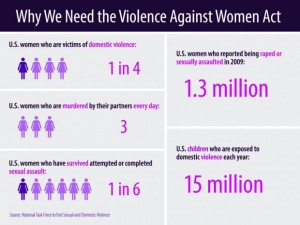Three women a day are killed as a result of domestic violence. Every one out of five women are raped in their lifetime. These sobering statistics are why reauthorization of the Violence Against Women Act (VAWA) should be above petty politics. Unfortunately, House Republicans are casting aside their moral compass for their political one and women across the country are being left vulnerable.
The annual incidence of domestic violence has decreased by more than 53 percent since VAWA became law in 1994 and reporting by victims has also increased by 51 percent. This dramatic improvement helps explain why the VAWA has been reauthorized twice since 1994 without controversy.
The latest version of the bill, which has bipartisan support in the Senate from Democrats and Republicans, broadens the law by expanding its provisions to cover Native Americans, gays, and lesbians. The bill would also give more emphasis to sexual assault prevention and take steps to reduce the rape kit backlog.
While the bill is expected to pass in the Senate with bipartisan support, House Republicans are balking at the prospect of allowing tribal courts to prosecute non-Native Americans who commit domestic and sexual violence on reservations. Perhaps they should look at the statistics.
Compared with other groups, Native American women are more likely to be raped and abused. The National Congress of American Indians released findings that showed 39 percent of American Indian and Alaska native women will experience violence by a partner in their lifetimes.
Currently, non-Native Americans who abuse their spouses often go unpunished because federal authorities don’t have the resources to pursue misdemeanors committed on reservations.
At UFCW, we have a long, proud history of standing up for fair and equal treatment of all workers both inside and outside of the workplace. Expanding the VAWA to Native Americans, gays, and lesbians isn’t just an essential step towards ensuring the domestic abuse crisis in this country is met, it’s also the right and fair thing to do.
Moderate House Republicans should call on their leadership to pass the bipartisan Senate bill as soon as they are able. Lives are depending upon this bill getting off the back burner and passing. The battered and abused don’t have time for these political games.

